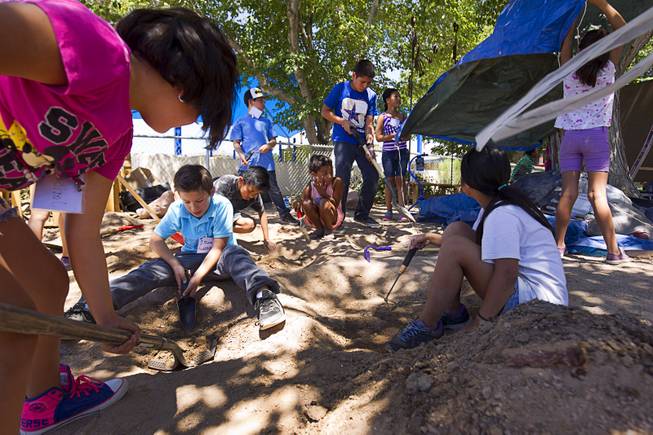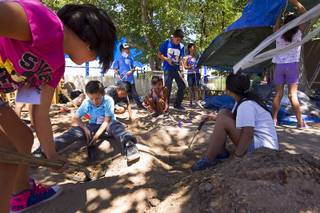
Students prepare a planting area during a summer garden camp at Crestwood Elementary School Tuesday, June 16, 2015. Green Our Planet, a Las Vegas nonprofit organization established in 2013, has helped establish gardens in dozens of area schools.
Sunday, June 28, 2015 | midnight
Walter Bracken Elementary School third-graders cup soil in their hands, preparing planters and tending to budding roots.
Their school is not typical.
Sobering statistics
83 percent of the U.S. population lives in metropolitan areas, meaning most children have little contact with nature.
The average American child spends 8 hours per day in front of an electronic screen.
30 percent of Americans between the ages of 2 and 19 are overweight or obese.
1 in 8 American children takes medication to combat Attention Deficit Hyperactivity Disorder
Encouraging results
■ In a Kentucky elementary school, students’ test scores improved 25 percent in science, 21 percent in reading and 40 percent in social studies after integrating a school garden into the curricula.
■ School gardening has been shown to increase students’ self-esteem, help them develop a sense of ownership and responsibility, help foster relationships with family members and increase parental involvement.
■ Exposure to school gardens increased students’ interest in eating fruit and increased the variety of vegetables they eat.
Source: Green Our Planet
Traditional classrooms are filled with desks and whiteboards. Bracken has buried tradition in favor of growing something new: classroom gardens. It is among dozens of Clark County schools that, thanks to local nonprofit Green Our Planet, have a on-campus gardens.
Since it began in January 2013, Green Our Planet has helped build gardens in 64 Clark County schools.
The goal is to teach local children about environmental issues, health and conservation, and expose them to STEM (science, technology, engineering and math) topics. Students learn about plant growth and decomposition, participate in weekly farmers markets selling produce they grow, and receive instruction from local chefs and farmers about food and nutrition.
Fifth-graders even are tasked with protecting the gardens after school from younger, strawberry-stealing students.
How it’s done
Green Our Planet teams with local and national companies to provide a fund-gathering platform so schools can raise money for garden projects. Clark County partners include most of Las Vegas’ large resort companies, Pardee Homes, the NV Energy Foundation, Whole Foods, Honey Salt, Zappos and Jamba Juice.
Projects vary in price, but each garden bed tends to cost about $900. Most schools have five or six raised beds that measure 3 to 4 feet wide. The price fluctuates depending on the materials used. Installation and maintenance is done by local company Garden Farms of Nevada.
STEM lessons
Kindergartners are the caretakers; they get to explore the garden, help with cleanup and learn the basics of what plants need to survive. First-graders learn about the plant life cycle, from digging a hole to harvest. Second-graders are “bug detectives,” learning about what insects eat and how they affect the ecosystem.
By third grade, students are in charge of composting and analyzing the weather, climate and soil. Fourth-graders explore natural systems, observing patterns in nature and the flow of energy in their garden. In fifth grade, students become entrepreneurs; after developing a business plan, they run a farmers market at their school selling the produce they have tended to during their elementary school careers.
Meanwhile, chef-to-school programs provide in-class instruction from 40 trained chefs who share tips about healthy eating, nutrition and cooking.
Using a grant received last year from the American Honda Foundation, Green Our Planet paid Clark County teachers to develop a curriculum that incorporates the garden and meets state and national science standards.
“It’s called a ‘live curriculum’ because it is constantly updated and upgraded through teacher feedback,” said Sabina Malik, Green Our Planet coordinator.
What’s next
During the upcoming school year, eight schools are slated to expand their outdoor garden classrooms. Students will be able to learn beneath trees, surrounded by fruits and vegetables they helped grow. The classrooms also will have a large white board, seating, murals and tables.


Join the Discussion:
Check this out for a full explanation of our conversion to the LiveFyre commenting system and instructions on how to sign up for an account.
Full comments policy